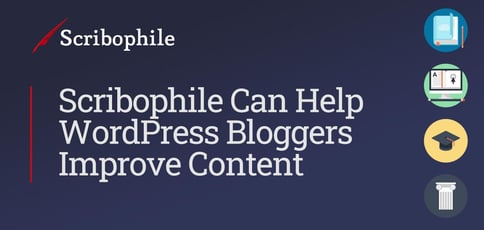
TL; DR: Scribophile connects writers with a community of peers eager to help them improve their content. The free service supports either beta reads or chapter critiques, which can help aspiring tech thought leaders fine-tune their manuscript or develop incisive blog posts on their WordPress sites. Scribophile’s emphasis on quality control and community development also allows writers of all stripes to network and develop long-term relationships.
A well-managed blog remains the gold standard for content marketing. By launching a WordPress site, especially a self-hosted solution, you control your message with less reliance on various social platforms. Yet blogging won’t help you solidify a value proposition unless your posts are well-written, well-reasoned, and free of grammatical errors.
Blog posts must dazzle readers not only with the ideas they convey but also with crisp language. Many entrepreneurs and tech leaders outsource blog posts to freelance writers, but that proposition can be expensive. A less expensive solution lies in self-generated content that’s improved by freelance editors.
The most attractive solution — one that preserves the blogger’s voice while cutting costs to zero — lies in well-crafted content that’s written by site owners themselves but that’s informed by external peer critique.

Scribophile users can receive advice from other writers before they post content on their WordPress sites.
Scribophile, which launched in 2008, is a free platform that can help entrepreneurs polish their content and improve their sites. It is a place where writers can share their work and receive in-depth critiques to help fine-tune both the message and their voice and language.
Alex Cabal, the Founder of Scribophile, said the authors on the platform form lasting relationships.
“The community itself is my favorite part,” he said. “You see strangers from all over the world come together at Scribophile, and then friendships and relationships blossom — professional, and even sometimes romantic ones. Seeing writers come together, help each other succeed, get their work published, and form lasting friendships is the most rewarding part of running Scribophile.”
Because Scribophile is optimized for long-form works, it’s also an ideal service for the budding tech thought leaders eager to release a well-written book to market.
Peer Critique Can Help Fine-Tune Stories Without Editing Fees
Freelance editors worth their salt don’t come cheap. Although you’ll find editors of all stripes on gig sites, the best editors bring many years of experience and some knowledge of your niche into play. At that level of skill, median rates run between three cents and five cents per word, so your 1,200-word blog post might cost $50 to edit. Write four of those posts per week, and your monthly editing bill may creep to $600 with a volume discount and a long-term contract.
However, hiring skilled editors takes time and effort, and each editor brings his or her strengths and weaknesses to the table. And for something as straightforward as a WordPress blog post, which doesn’t necessarily conform as strictly to a formal style guide, a paid editor may be overkill.
“You can certainly pay an editor to help you with your work, but that’s just one person’s opinion, and often an expensive one,” Alex said. “You can also ask your friends and family for help, but if they’re not writers, it can be hard to get good feedback that way. The most valuable aspect of participating in Scribophile is receiving objective, helpful, and actionable feedback from a pool of tens of thousands of writers from all over the world.”

The Scribophile dashboard allows writers to keep track of current events and projects under review.
Crowdsourcing your edits has several benefits and none of the typical overhead cost. Because there’s more than one voice participating in the discussion, you’ll see a greater diversity of opinions play out. And because everyone’s good at something, your critique will be more well-rounded than if only one other set of eyes reviewed it.
In addition, Scribophile offers a Writing Academy that delivers targeted writing advice and tips for developing creative content and engaging narratives. Although the Academy is geared toward fiction writers, nuts-and-bolts advice about passive voice and the “show don’t tell” guidance for compelling storytelling remains relevant for every writer, regardless of genre.
Users Can Get In-Depth Chapter Feedback or Full-Book Beta Reads
Many thought leaders, especially tech evangelists, write books to support their message and to build credibility among potential clients. Whether they are a collection of posts on a WordPress site or a book-length narrative written from scratch, books prove useful on the speakers’ circuit. Scribophile is an excellent solution for that kind of substantive project. The platform supports both chapter critiques, that deliver in-depth reviews of a single chapter, or beta reads that offer high-level comments about an entire book.

Scribophile Founder Alex Cabal spoke with us about the lasting relationships the platform fosters.
“Writers have the option to form groups to post their work to, and have a discussion in their group forum,” Alex said. Thus, an author could form a group with a trusted circle of reviewers and work away from the general public, a useful feature for projects with proprietary information. Alex said that Scribophile has slated a series of new enhancements for the group’s system to deploy in 2021.
This community-within-a-community builds on Scribophile’s quality control infrastructure.
“The big challenge in maintaining any community, not just a writing community, is keeping things active and maintaining a standard of quality,” he said. “At Scribophile, we have rules in place tailored to keeping feedback friendly and collegial, and we have very talented moderators enforcing those rules.”
One potential use case: Assemble trusted critique partners in a private group on Scribophile to comment on scheduled WordPress blog posts or chapters of a forthcoming thought-leadership text. And as a bonus, you’re free to invite your group to write guest posts on your blog’s website builder.
Scribophile: A Community Helping Writers Upgrade their Skills
Scribophile’s targeted public or private-group critiques can reduce costs, protect intellectual property if you use private groups, and present users with diverse perspectives about their content.
By design, the platform encourages reciprocity; users have to share critiques as well as receive them. Alex said that was missing when he started Scribophile.
“There were a few writing communities at that time, but many of them were basic — a simple forum or mailing list. It was difficult to get solid feedback on your writing in those environments because there was no built-in system of feedback exchange,” Alex said. “Anyone could join a forum and post their writing without critiquing anything first. So I wanted to create a system that would guarantee that everyone gets good feedback on their writing in a timely manner.”
This emphasis on community opens doors to relationships that generally prove more challenging to manage in a paid client relationship.
Although the publishing industry is slow to evolve, Scribophile has focused on core features without adding unnecessary bells and whistles. That stability helps users concentrate on critiquing without addressing frequent platform rebuilds, and it helps WordPress bloggers and emerging thought leaders focus on content rather than software management.
Ultimately, though, the question comes down to effectiveness. And Scribophile works as advertised.
“We’re excited to keep seeing our members get published,” Alex said. “This year we’ve had members get published with Berkeley, Penguin/RandomHouse, Simon & Schuster, Manilla Press/Bonnier, and many, many others.”
HostingAdvice.com is a free online resource that offers valuable content and comparison services to users. To keep this resource 100% free, we receive compensation from many of the offers listed on the site. Along with key review factors, this compensation may impact how and where products appear across the site (including, for example, the order in which they appear). HostingAdvice.com does not include the entire universe of available offers. Editorial opinions expressed on the site are strictly our own and are not provided, endorsed, or approved by advertisers.
Our site is committed to publishing independent, accurate content guided by strict editorial guidelines. Before articles and reviews are published on our site, they undergo a thorough review process performed by a team of independent editors and subject-matter experts to ensure the content’s accuracy, timeliness, and impartiality. Our editorial team is separate and independent of our site’s advertisers, and the opinions they express on our site are their own. To read more about our team members and their editorial backgrounds, please visit our site’s About page.



